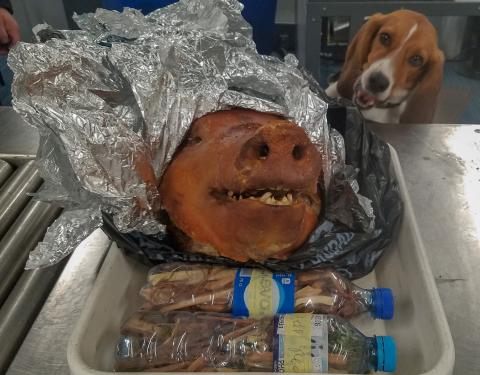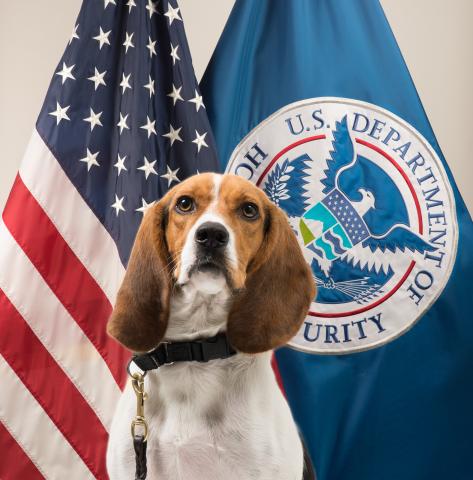WASHINGTON, October 22, 2018 – When Hardy, a U.S. Department of Agriculture (USDA) trained detector dog, sniffed out a roasted pig head in traveler baggage at Atlanta’s Hartsfield-Jackson International airport early this month, it underscored the efforts USDA and its partners are undertaking to keep African Swine Fever (ASF), a swine disease that could devastate the U.S. pork producers, from entering the country.

USDA continues to train dogs at its National Detector Dog Training Center in Newnan, Georgia. The center is designed and equipped to train detector dog teams (canines and handlers), like Hardy’s, to safeguard American agriculture. USDA’s Animal and Plant Health Inspection Service Plant Protection and Quarantine program and the Department of Homeland Security’s U.S. Customs and Border Protection (CBP) use detector dog teams, known as the Beagle Brigade, to search for prohibited agricultural products at major U.S. ports of entry (airports and land border crossings), mail and cargo facilities. The teams detect prohibited agricultural products that can carry foreign pests and diseases that threaten U.S. agriculture and forests.
“African Swine Fever is a devastating, deadly disease affecting all kinds of pigs, both domestic and wild – and keeping our pork industry safe is a top priority,” said Sonny Perdue, U.S. Secretary of Agriculture. “Recently, our collaboration with CBP proved successful when a USDA trained detector dog intercepted a roasted pig head in traveler baggage from Ecuador. The quick work of a beagle and the CBP staff prevented a potential animal health issue and further highlighted the need to be vigilant in safeguarding the U.S. against foreign animal diseases.”

Concern over ASF is not new. It is a long-standing disease found in countries around the world, particularly in sub-Saharan Africa. However, confirmation of cases in China and the European Union over the past several months prompted USDA to review and strengthen its protections. This involves partnering with the swine industry, producers, CBP, and the travelling public to help ensure we protect American agriculture.
To prevent ASF from entering the country, USDA has in place a series of interlocking safeguards. They include:
- Collaborating with states, industry and producers to ensure everyone follows on-farm biosecurity and best practices (including for garbage feeding in states where that is allowed);
- Restricting imports pork and pork products from affected countries; and
- Working with CBP staff at ports of entry to train their inspection dogs, as well as to increasing screening vigilance to pay particular attention to passengers and products arriving from affected countries.
USDA is committed to working closely with the swine industry and producers to ensure strict biosecurity procedures are in place and being followed on all swine farms.
“Because there’s no treatment or vaccine available for this disease, we must work together to prevent this disease from entering the United States in order to best protect our farmers, our consumers and our natural resources,” said Perdue. “Good biosecurity is key to protecting pigs from any disease. We know the swine industry has many biosecurity resources available for their producers, so it’s just a matter of making sure everyone follows the guidance, every day, every time. Our goal is to never have to respond to African Swine Fever.”
USDA is actively readying and planning its response, should the disease ever be found in the U.S. by working with states and industry to test response mechanisms on a regular basis and planning to increase the testing capacity of the National Animal Health Laboratory Network labs for ASF.
USDA is also asking all veterinarians and producers to be aware of the signs of illness: high fever; decreased appetite; weakness; red, blotchy or lesions on the skin; diarrhea, vomiting, coughing and difficulty breathing. Quick detection is key to preventing disease spread, so USDA is stressing the importance of reporting sick pigs to state or federal animal health officials immediately so that a disease investigation and appropriate testing can occur.
International travelers also need to be aware of this disease, as they could unknowingly carry the virus into the U.S. Anyone who has contact with pigs or swine farms on travel must ensure they carefully clean and disinfect their shoes, wash their clothes and shower prior to having contact with pigs here in the U.S. Report the visit on the CBP form (question 12). Travelers looking to bring back agricultural items or souvenirs should check USDA’s travelers web page to see if the item(s) are allowed.
#
USDA is an equal opportunity provider, employer and lender.





修改评论